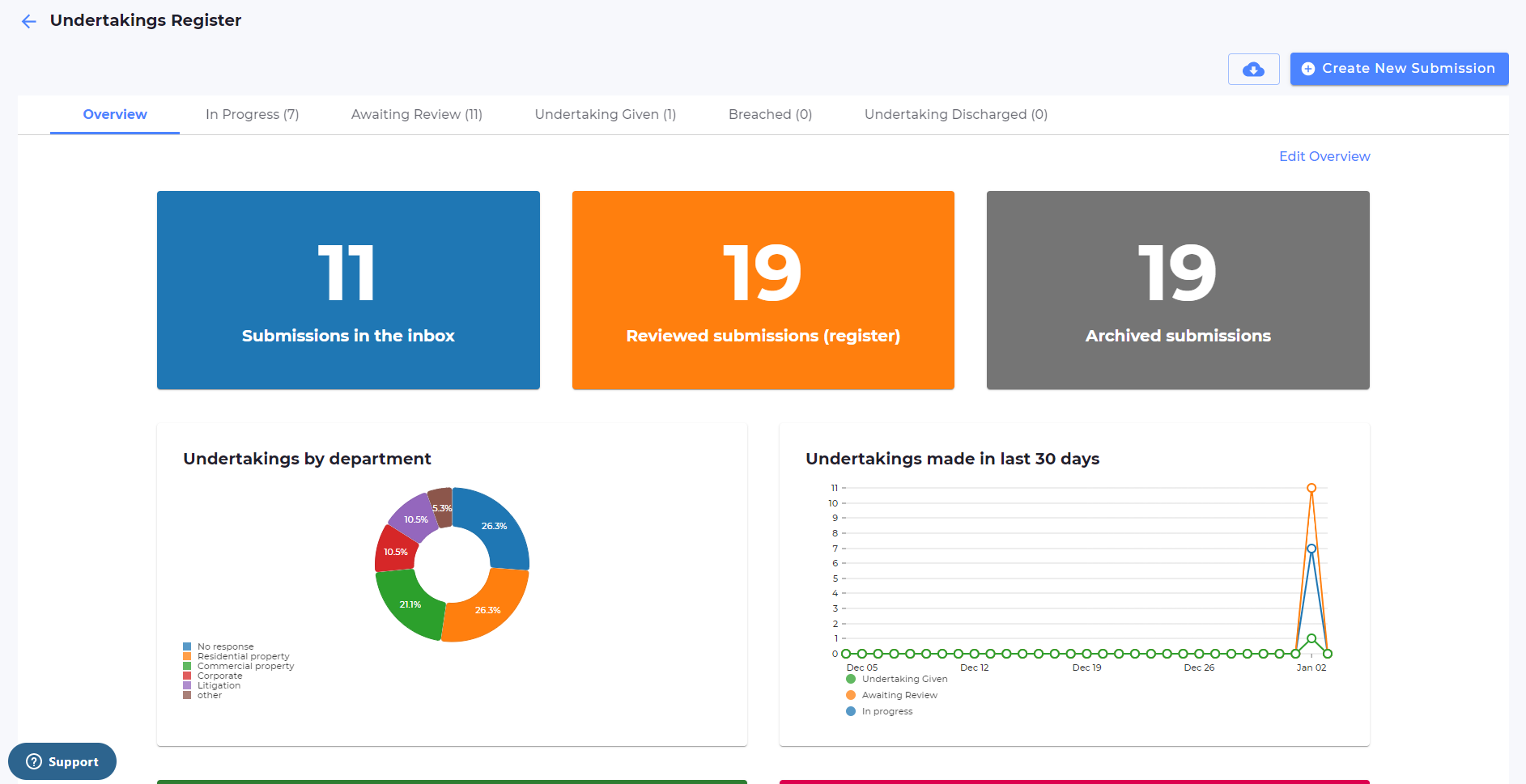Part of VinciWorks’ SRA Compliance Suite: record and track all undertakings in one location
The VinciWorks’ SRA Compliance Suite is hosted in Omnitrack, a powerful yet flexible data collection and reporting tool. Established use cases in the SRA Compliance suite include a Regulatory Breaches Register, a Conflicts Register, a File Review process and more. The SRA suite also includes the Undertakings Register, a centralised tool to record, review and track all solicitor undertakings, ensuring staff receive reminders to fulfil all obligations which have yet to be discharged.
Before we take a closer look at the Omnitrack Undertaking Register, this blog will recap the definition of solicitors’ undertakings and look at some of the consequences of failing to complete them.
What is an undertaking?
An undertaking is a type of promise made by a solicitor. In order for the promise to constitute an undertaking, it need not be in writing, or include the word “undertake” or “undertaking”. But the statement must be:
- Made by the solicitor in their capacity as a solicitor;
- A commitment that the solicitor or a third party (such as their client) will carry out, cause to be carried out, or refrain from carrying out an act;
- Made to someone who reasonably places reliance on it
When are undertakings used?
Undertakings are frequently used by property lawyers. For example, a seller’s solicitor may provide an undertaking to the buyer’s solicitor that they will redeem their client’s mortgage on completion of the sale. This could be accompanied by a further undertaking to obtain evidence from the client’s lender demonstrating that this has been done. The seller’s solicitor may also provide an undertaking to the purchaser’s solicitor that they have authority from the seller to receive the purchase monies.
Undertakings can also be made to advance funds to specific parties or lenders on completion of property or commercial transactions, and undertakings can be used to provide assurance that funds will not be advanced until certain events have occurred.
But undertakings do not only take place in transactional matters; they can also arise in litigation. For example, a solicitor may provide an undertaking not to disclose privileged or confidential information relating to a case to certain individuals within a firm.
What are the consequences for failing to complete an undertaking?
Regardless of the context in which it has been made, breaching an undertaking can have serious consequences on firms and their solicitors. The person to whom the undertaking was made can complain to the SRA, who can impose disciplinary proceedings on the lawyer or the firm. The person who relied on the undertaking can also try to enforce it by applying to court.
The severity of failing to complete an undertaking has been highlighted in a recent story of a firm and its owner who were fined for failing to fulfil their obligations, as reported in the Law Society Gazette. The firm and its owner received a fine of £12,000 for failing to complete a series of undertakings made to the lender’s law firm in the course of a client’s refinance. Stories such as these underline the importance for firms to establish and maintain central records, which can be used to avoid such situations.
How can Omnitrack help?

The Omnitrack Undertakings Register makes it easy for fee earners to record undertakings when they are given by your firm, and to keep track of any which have yet to be discharged. Some of its key features include:
- Built on best practice
The questionnaire encourages lawyers to anticipate issues before they arise, making it less likely breaches will occur. Users are asked to record any deadlines for performing the undertaking, and system admins review proposed undertakings, deciding whether the promise is one the firm is likely to be able to deliver.
- Conditional logic
The form adapts as it is completed, so users only answer relevant questions. For example, a partner who wants to record an undertaking may only need to complete a shortened version of the form. Whereas an associate seeking approval of the draft wording of a proposed undertaking may need to provide more information.
- Admin Review
Once a user completes the form, admins can assess the risks involved and decide whether to approve the proposed undertaking. They can later mark undertakings as discharged or breached, add deadlines, or send information requests to the user.
- Track status of undertakings
The graphical dashboard provides an overview of all undertakings and their current status, including whether or not they have been reviewed or discharged. The dashboard can also be used to generate reports or identify missing information.
As with all Omnitrack use cases, the Undertakings Register is built in line with best practice, but can be adapted to suit your needs. Its flexibility means you decide whether to use the workflow as a simple register of all undertakings or, in addition, as a means for junior lawyers to obtain approvals for proposed undertakings.
Whether you wish to change the automation rules for the frequency of reminders, add guidance notes or links to the SRA Code of Conduct to the workflow, amend specific questions, or even build your own form from scratch, Omnitrack can help you. VinciWorks’ intuitive and sleek system can ensure you fulfil all undertakings.
Contact us now to book a demo
To book a demo, complete the short form below and we will be in touch.












